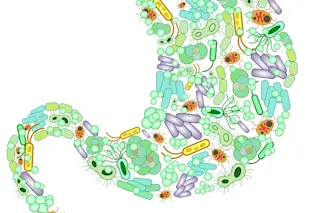The microbes that live in and on our bodies are fundamentally involved in our well-being. How they affect our health, though, is largely unknown due to the number of different bacteria that call us home and the complexity of our interactions with them.
A project from the National Institutes of Health, the Integrated Human Microbiome Project (iHMP) is attempting to dive into those interactions and understand the nitty-gritty of how the microbiome affects human health and disease.
Three new studies from the project each tackle a different aspect of human-microbe interactions.
One looks at how the microbiome changes in inflammatory bowel disease, another at how respiratory infections might lead to type 2 diabetes, and the third examines how the vaginal microbiome may predict preterm birth.
Curtis Huttenhower, of the Harvard T. H. Chan School of Public Health, and colleagues investigated the collection of microbes that live in the digestive tract, ...














